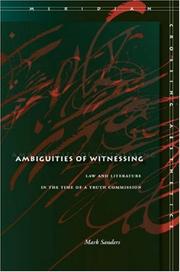| Listing 1 - 3 of 3 |
Sort by
|
Book
ISBN: 9780197582626 0197582621 0190881852 0190881879 0190881887 0190881860 Year: 2021 Publisher: New York (N.Y.): Oxford University Press,
Abstract | Keywords | Export | Availability | Bookmark
 Loading...
Loading...Choose an application
- Reference Manager
- EndNote
- RefWorks (Direct export to RefWorks)

ISBN: 9780804756150 0804756155 Year: 2007 Publisher: Stanford (Calif.) : Stanford University Press,
Abstract | Keywords | Export | Availability | Bookmark
 Loading...
Loading...Choose an application
- Reference Manager
- EndNote
- RefWorks (Direct export to RefWorks)
The first book to explore the complex relationship between law and literature in testimony to crimes of apartheid before South Africa's Truth and Reconciliation Commission, 'Ambiguities of Witnessing' closely analyzes key individual testimonies. Whereas most existing books on this and other truth commissions are weighed down by abstract legal and philosophical discussion, this book does justice to witnesses' public testimony in a fascinating and theoretically sophisticated investigation of questions of human rights, mourning, forgiveness, and reparation. Framed by the personal, 'Ambiguities of Witnessing' also meditates on what it means for the writer to respond to this epochal event in the history of post-apartheid South Africa.
Political crimes and offenses --- Truth commissions --- Human rights --- Amnesty --- Reconciliation --- Political aspects --- South Africa. --- South Africa --- Politics and government --- Political crimes and offenses - South Africa --- Truth commissions - South Africa --- Human rights - South Africa --- Amnesty - South Africa --- Reconciliation - Political aspects - South Africa --- South Africa - Politics and government - 1989-1994 --- South Africa - Politics and government - 1994 --- -Amnesty --- -Political crimes and offenses - South Africa --- -Political crimes and offenses

ISBN: 0521802199 0521001943 1107122988 9786612486517 0511673671 0511674864 0511672888 0511670338 0511522290 1282486519 051167161X 9780521802192 9780521001946 9780511674860 9780511671616 9780511670336 9780511522291 9781107122987 9781282486515 6612486511 9780511673672 9780511672880 Year: 2001 Publisher: Cambridge Cambridge University press
Abstract | Keywords | Export | Availability | Bookmark
 Loading...
Loading...Choose an application
- Reference Manager
- EndNote
- RefWorks (Direct export to RefWorks)
The South African Truth and Reconciliation Commission (TRC) was set up to deal with the human rights violations of apartheid during the years 1960-1994. However, as Wilson shows, the TRC's restorative justice approach to healing the nation did not always serve the needs of communities at a local level. Based on extended anthropological fieldwork, this book illustrates the impact of the TRC in urban African communities in Johannesburg. While a religious constituency largely embraced the commission's religious-redemptive language of reconciliation, Wilson argues that the TRC had little effect on popular ideas of justice as retribution. This provocative study deepens our understanding of post-apartheid South Africa and the use of human rights discourse. It ends on a call for more cautious and realistic expectations about what human rights institutions can achieve in democratizing countries.
Reconciliation --- Post-apartheid era --- Political aspects --- South Africa --- Politics and government --- Apartheid --- Retribution. --- Human rights --- Criminal law. Criminal procedure --- National movements --- Race relations --- Retribution --- #SBIB:328H413 --- #SBIB:39A11 --- #SBIB:39A73 --- Social exchange --- Punishment --- Revenge --- Blacks --- Segregation --- Instellingen en beleid: Zuid-Afrika --- Antropologie : socio-politieke structuren en relaties --- Etnografie: Afrika --- South Africa. --- Commission for Truth and Reconciliation (South Africa) --- South African Truth Commission --- TRC --- Truth and Reconciliation Commission (South Africa) --- Race relations. --- Race question --- Black people --- Law --- General and Others --- Reconciliation - Political aspects - South Africa --- Post-apartheid era - South Africa --- Apartheid - South Africa --- South Africa - Politics and government - 1994 --- -South Africa - Race relations
| Listing 1 - 3 of 3 |
Sort by
|

 Search
Search Feedback
Feedback About UniCat
About UniCat  Help
Help News
News